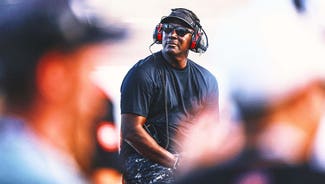
NASCAR's Hendrick adds 2nd plane to Haiti relief
Rick Hendrick didn't have a moment of hesitation when it came to
finding a way to aid the Haitian earthquake relief efforts.
His wife and daughter had made a mission trip years earlier
to the impoverished nation, giving the Hendrick family insight into
the serious level of needs in Haiti.
More important, though, is that they understand feelings of
hopelessness.
The NASCAR team owner lost his son, brother, twin nieces and
several key employees in a 2004 plane crash. Several hours passed
between the time the plane was reported missing and finally found,
and recovery was made difficult because of the remote Virginia
crash site.
"I guess because in a really nasty, sad way, I know what's it
like to have your family on the side of a mountain and you can't
get to them," Hendrick said Wednesday. "If everybody could be
standing there looking at the people in Haiti, see the children,
immediately I thought that if my house was crumbled and I had
family stuck in there, I'd want anyone who could possibly help to
help.
"I know what it's like to feel helpless."
Hendrick last week loaned one 45-passenger plane and an
eight-person crew to an organization that is making mission flights
into Haiti, but because of the desperate need in Haiti, the team
has since made available a second Hendrick Motorsports airplane.
In all, 10 members of the Hendrick aviation team are
volunteering with Missionary Flights International to take both
planes in and out of Port-au-Prince on daily flights. They are able
to track the trips online, and Hendrick general manager Marshall
Carlson on Monday noticed that one of the planes had not left Haiti
as scheduled.
Carlson said he tried to reach HMS aviation director Dave
Dudley in Haiti, and received a text back: "Leaving Haiti with 26
orphans should be departing in 30 minutes," Dudley wrote.
The children, Carlson later learned, had been adopted by
American families before the earthquake struck and had been in the
red-tape process of waiting for paperwork to be finalized before
they could meet their new families. The process was expedited after
the earthquake, but the children still needed transport out of
Haiti.
"Those are the situations they are encountering every day, a
new need pops up and a new way we can help," said Carlson, who is
also Hendrick's son-in-law. "It's just very, very moving to hear
these stories and see pictures of children being carried off the
plane to their waiting families. Anything we can do to help,
because it's needed."
The children were brought to Fort Pierce, Fla. to join their
new families.
The two HMS planes are committed to daily trips through
January, and Hendrick will allow them to be used beyond that for
scheduled flights that coordinate with the race team travel. The
planes are typically used to take his teams to and from events, and
the season begins early next month.
Hendrick, who made a similar gesture after Hurricane Katrina,
is covering the cost of all flights, which have primarily been used
to take supplies and support teams into Port-au-Prince. But since
news of his effort went public last Friday, they've received
numerous requests for help from strangers.
Carlson said the team was contacted by a Haitian
schoolteacher who had arrived in North Carolina for her first
vacation in 14 years the day before the earthquake, and she was
able to return home on one of the flights. Help was also given to a
NASCAR employee who needed help getting the body of a family friend
back to the U.S.
A woman who read about the flights contacted Carlson to ask
if there was anything he could do to help get aid to 150 kids in a
remote orphanage that had yet to be reached by rescuers. Carlson
was able to pass the information to the HMS crew, and Missionary
Flights was able to coordinate with another group that was able to
reach the location.
"I've got all these pictures and notes, all these U.S.
citizens who have sent letters and e-mails that they were trapped
and wouldn't have made it another two or three days if we hadn't
gotten them out," Hendrick said. "We delivered some surgeons and
before our plane made it back to the U.S., they were operating in
the street.
"You can't even comprehend some of the stories we are
hearing."

